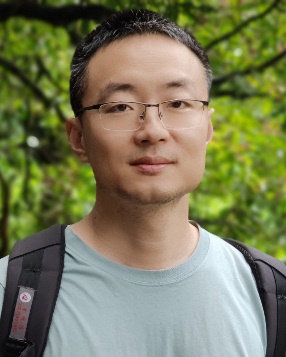Hu Jinchuan
 Jinchuan Hu, Ph.D.
Jinchuan Hu, Ph.D.
2004, Peking University, B.S.
2012, Institute of Microbiology, Chinese Academy of Science, Ph.D.
2012-2017, University of North Carolina at Chapel Hill, Postdoc/Research Associate,
2018- , Fudan University, Principal Investigator
Institutes of Biomedical Sciences, Fudan University, Shanghai 200032
Tel: +86-21-54237702
Email: hujinchuan@fudan.edu.cn
Jinchuan took his undergraduate training at Peking University from 2000 to 2004. He then joined Dr. Li Huang’s lab at Institute of Microbiology, CAS to pursue his Ph.D. degree in the field of DNA replication and repair. After graduation in 2012, Dr. Hu moved to University of North Carolina at Chapel Hill and worked as a postdoc in the field of DNA damage and repair with Nobel laureate Dr. Aziz Sancar till 2017. In Sancar lab, Dr. Hu developed two novel methods, named Damage-seq and XR-seq, to map DNA bulky adducts and nucleotide excision repair, respectively, at single-nucleotide resolution in human genome for the first time. In 2018, Dr. Gu joined the Institutes of Biomedical Sciences at Fudan University as a Principal Investigator, and since then has been running the DNA Damage and Repair Lab there.
Develop and utilize novel sequencing techniques to study DNA damage and repair at genomic level.
The Hu lab has two major focuses. The first is to investigate how nucleotide excision repair is regulated in chromatin environment. The second is to develop new methods to detect DNA base modifications at single-nucleotide resolution and study the distribution, regulation and function of these modifications.
The basic mechanism of nucleotide excision repair has been well studied. However, due to the lack of a proper in vitro system, the exact mechanism of transcription-coupled nucleotide excision repair and the regulation of nucleotide excision repair by epigenetic modifications are poorly understood. The Hu lab is aiming to answer these questions by studying in vivo nucleotide excision repair at genomic level with new sequencing techniques.
DNA base modifications such as oxidative lesions (8-oxo-dG, 5-hmdU, etc.) are known as DNA damage which may cause mutation and genome instability. However, more and more evidence indicated that they might also regulate gene expression and function as epigenetic markers. In order to study their roles in both mutagenesis and epigenetics, the Hu lab is developing new methods to map these modifications at single-nucleotide resolution throughout the genome. These methods will help investigate how cells response to both exogenous and endogenous oxidative stress by regulating transcription and repairing oxidative damage at specific loci.
Besides the basic science questions, the Hu lab will also study the roles of DNA damage and repair events in human diseases including Cockayne syndrome and inflammation-related diseases, and search the effective strategies to deal with them.
1. Pengfei Dai#, Yuanqing Tan#, Yifeng Luo#, Tingting Liu, Yanchao Huang, Yafang Shang, Min Emma Huang, Xiaojing Liu, Senxin Zhang, Yanyan Wang, Qian-Xi Li, Niu Li, Lulu Li, Yining Qin, Junqi Liu, Liu Daisy Liu, Xia Xie, Yanni Cai, Fei Xavier Chen, Xiaoqi Zheng, Leng-Siew Yeap, Jian Wang*, Jinchuan Hu*, Fei-Long Meng*. Transcription-coupled AID deamination damage depends on ELOF1-associated RNA polymerase II, Molecular Cell, 2025, 85(7): 1280-1295.e9.
2. Yuanqing Tan#, Meng Gao#, Yanchao Huang, Delin Zhan, Sizhong Wu, Jiao An, Xiping Zhang, Jinchuan Hu*. STK19 is a transcription-coupled repair factor that participates in UVSSA ubiquitination and TFIIH loading. Nucleic Acids Research, 2024, 52(21): 12767-12783. (Breakthrough Article & Cover)
3. Yongchang Zhu#, Xiping Zhang#, Meng Gao#, Yanchao Huang, Yuanqing Tan, Avital Parnas, Sizhong Wu, Delin Zhan, Sheera Adar, Jinchuan Hu*. Coordination of transcription-coupled repair and repair-independent release of lesion-stalled RNA polymerase II. Nature Communications, 2024, 15(1): 7089.
4. Yongchang Zhu#, Yuanqing Tan#, Lin Li#, Yuening Xiang, Yanchao Huang, Xiping Zhang, Jiayong Yin, Jie Li, Fei Lan, Maoxiang Qian*, Jinchuan Hu*. Genome-wide mapping of protein–DNA damage interaction by PADD-seq. Nucleic Acids Research, 2023, 51(6): e32.
5. Yanchao Huang#, Cem Azgar#, Mengdie Yin, Yi-Ying Chiou, Laura A. Lindsey-Boltz, Aziz Sancar, Jinchuan Hu*, Ogun Adebali*. Effects of replication domains on genome-wide UV-induced DNA damage and repair. PLoS Genetics, 2022, 18(9): e1010426.
6. Sizhong Wu, Yanchao Huang, Christopher P Selby, Meng Gao, Aziz Sancar*, Jinchuan Hu*. A new technique for genome-wide mapping of nucleotide excision repair without immunopurification of damaged DNA. Journal of Biological Chemistry, 2022, 298(5): 101863.
7. Liudan Jiang#, Jiayong Yin#, Maoxiang Qian#, Shaoqin Rong, Shengqi Zhang, Kejing Chen, Chengchen Zhao, Yuanqing Tan, Jiayin Guo, Hao Chen, Siyun Gao, Tingting Liu, Yi Liu, Bin Shen, Jian Yang, Yong Zhang, Fei-Long Meng, Jinchuan Hu*, Honghui Ma*, Yi-Han Chen*. UdgX-Mediated Uracil Sequencing at Single-Nucleotide Resolution. Journal of the American Chemical Society, 2022, 144(3): 1323–1331.
8. Jiao An#, Mengdie Yin#, Jiayong Yin#, Sizhong Wu, Christopher P Selby, Yanyan Yang, Aziz Sancar, Guo-Liang Xu, Maoxiang Qian*, Jinchuan Hu*. Genome-wide analysis of 8-oxo-7,8-dihydro-2'-deoxyguanosine at single-nucleotide resolution unveils reduced occurrence of oxidative damage at G-quadruplex sites. Nucleic Acids Research, 2021, 49(21): 12252-12267.
9. Xiping Zhang, Mengdie Yin, Jinchuan Hu*. Nucleotide Excision Repair: A Versatile and Smart Toolkit. Acta Biochimica et Biophysica Sinica, 2022, 54(6): 807-819. (Review)
10. Jiao An#, Mengdie Yin#, Jinchuan Hu*. G-quadruplex and 8-oxo-7,8-dihydroguanine across the genome: methodologies and crosstalk. Genome Instability & Disease, 2022, 3: 241–254. (Review)